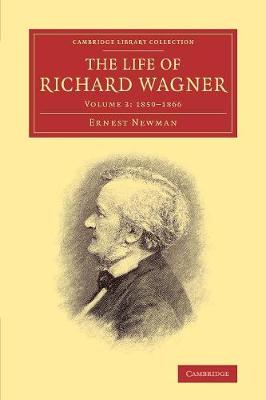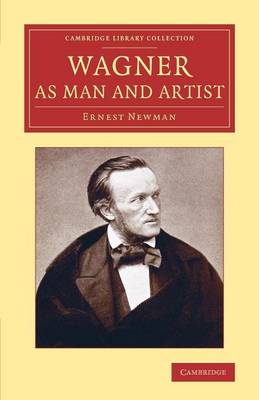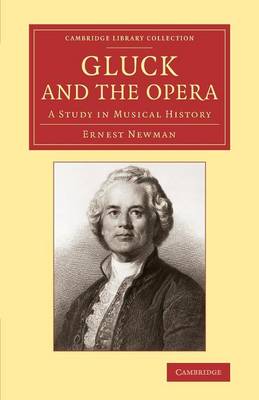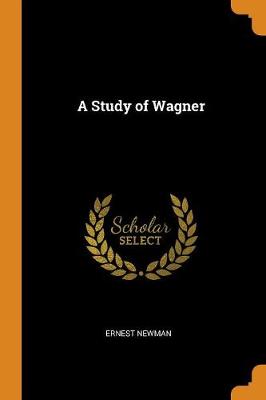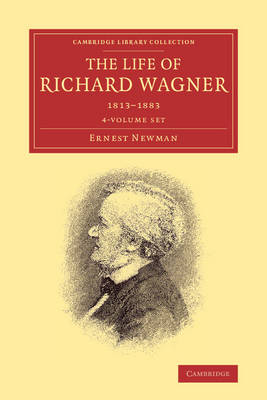Cambridge Library Collection - Music
1 primary work • 5 total works
Volume 3
Ernest Newman's four-volume Life of Wagner, originally published between 1933 and 1947, remains a classic work of biography. The culmination of forty years' research on the composer and his works (Newman's first Study of Wagner was first published in 1899), these books present a detailed portrait of perhaps the most influential, the most controversial and the most frequently reviled composer in the whole history of western music. Newman was aware that no biography can ever claim to be complete or completely accurate: 'The biographer can at no stage hope to have reached the final truth. All he can do is to make sure that whatever statement he may make, whatever conclusion he may come to, shall be based on the whole of the evidence available at the time of writing.' In this aim he triumphantly succeeds. Volume 3 covers the years 1859 to 1866.
Ernest Newman (1868-1959) was undoubtedly the greatest Wagnerian critic of his age. (His magisterial four-volume Life of Richard Wagner is also reissued in this series.) In this 1914 work, he attempts 'a complete and impartial psychological estimate' of a complex and frequently misinterpreted genius. He notes that such an attempt would have been impossible before the publication in 1911 of Wagner's autobiographical Mein Leben, but in his opening chapter he also warns against a naive reading of that work, and of others by people 'who combine the maximum of good intentions with the minimum of critical insight'. He is clear-sighted about the strengths of Wagner the artist, not least his need to be 'the central sun of his universe', which of course led to Wagner the man behaving pettily, selfishly and frequently as a tyrant. This lucid account richly deserves its place in the history of Wagner studies.
Early in his long career, the self-taught English music critic Ernest Newman (1868-1959) wrote this influential account of Gluck's life and musical achievements in relation to the intellectual life of the eighteenth century. First published in 1895, Gluck and the Opera traces the composer's ideas and his efforts to move opera forward after a period of stagnation. Musicians, thinkers and satirists had been writing for generations about the need to reform the opera, but it was Gluck who brought about far-reaching changes that paved the way for Mozart, Weber and Wagner. His most notable innovation was the fusing of the Italian and French operatic traditions. The first part of the book is a chronological account of Gluck's eventful career, which took him all over Europe but was centred on Paris and Vienna. The second part deals with Gluck in his broader cultural and intellectual context, and lists his works.
This is the first of several in-depth studies of Wagner and his music by the renowned music critic Ernest Newman (1868-1959), leading up to the great four-volume biography The Life of Richard Wagner, published 1933-47. This 1899 work presents a thoroughly researched critical analysis of the composer's aesthetics, philosophy, social and political ideas, and their expression through his musical development and theoretical writings. As Newman states in his introduction, his exploration of Wagner's personality through his works aims to answer the question, 'In virtue of what constitution of brain was he so great a musician?' The book considers all the major music dramas; looks at Wagner's theory of music, poetry and music drama; includes a biographical timeline giving the dates of his compositions, publications and other musical events of the period; and ends by discussing the essence of the composer's character and his contribution to music.
Ernest Newman's four-volume Life of Wagner, originally published between 1933 and 1947, remains a classic work of biography. The culmination of forty years' research on the composer and his works (Newman's first Study of Wagner was first published in 1899), these books present a detailed portrait of perhaps the most influential, the most controversial and the most frequently reviled composer in the whole history of western music. Newman was aware that no biography can ever claim to be complete or completely accurate: 'The biographer can at no stage hope to have reached the final truth. All he can do is to make sure that whatever statement he may make, whatever conclusion he may come to, shall be based on the whole of the evidence available at the time of writing.' In this aim he triumphantly succeeds.
